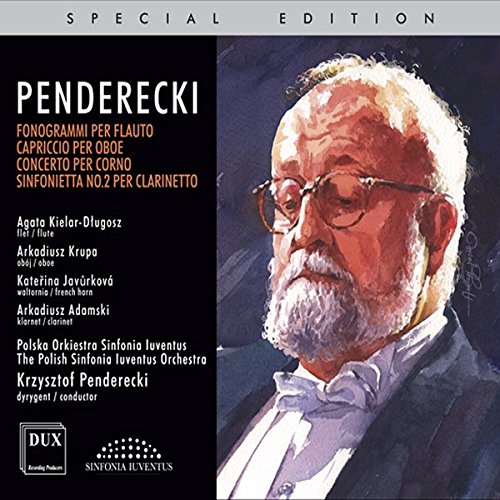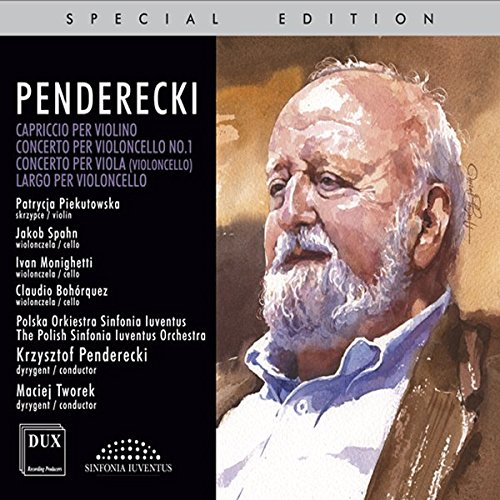PENDERECKI Concertos for Strings. Concertos for Wind
View record and artist detailsRecord and Artist Details
Composer or Director: Krzysztof Penderecki
Genre:
Orchestral
Label: Dux Recordings
Magazine Review Date: 06/2016
Media Format: CD or Download
Media Runtime: 47
Mastering:
DDD
Catalogue Number: DUX1274

Tracks:
| Composition | Artist Credit |
|---|---|
| Fonogrammi |
Krzysztof Penderecki, Composer
Agata Kielar-Długosz, Flute Krzysztof Penderecki, Composer Krzysztof Penderecki, Composer Sinfonia Iuventus |
| Capriccio |
Krzysztof Penderecki, Composer
Arkadiusz Krupa, Oboe Krzysztof Penderecki, Composer Krzysztof Penderecki, Composer Sinfonia Iuventus |
| Concerto for Horn and Orchestra, "Winterreise" |
Krzysztof Penderecki, Composer
Kateřina Javürková, Horn Krzysztof Penderecki, Composer Krzysztof Penderecki, Composer Sinfonia Iuventus |
| Sinfonietta No. 2 |
Krzysztof Penderecki, Composer
Arkadiusz Adamski, Clarinet Krzysztof Penderecki, Composer Krzysztof Penderecki, Composer Sinfonia Iuventus |
Composer or Director: Krzysztof Penderecki
Genre:
Orchestral
Label: Dux Recordings
Magazine Review Date: 06/2016
Media Format: CD or Download
Media Runtime: 78
Mastering:
DDD
Catalogue Number: DUX1275

Tracks:
| Composition | Artist Credit |
|---|---|
| Capriccio |
Krzysztof Penderecki, Composer
Krzysztof Penderecki, Composer Maciej Tworek, Conductor Patrycja Piekutowska, Violin Sinfonia Iuventus |
| Concerto for Viola and Orchestra |
Krzysztof Penderecki, Composer
Ivan Monighetti, Viola Krzysztof Penderecki, Composer Maciej Tworek, Conductor Sinfonia Iuventus |
| Concerto for Cello and Orchestra No. 1 |
Krzysztof Penderecki, Composer
Jakob Spahn, Cello Krzysztof Penderecki, Composer Maciej Tworek, Conductor Sinfonia Iuventus |
| Largo for Cello and Orchestra |
Krzysztof Penderecki, Composer
Claudio Bohorquez, Cello Krzysztof Penderecki, Composer Maciej Tworek, Conductor Sinfonia Iuventus |
Author: Ivan Moody
Ivan Monighetti is the soloist in the cello version (1989) of the Viola Concerto, and I think he has a harder task. This is a work of the ‘new’ Penderecki, the gestures still rather fragmented and the melodic content not hugely expansive, but nevertheless a milestone on the road to the composer’s post-tonal second period. The soloist’s task is hard, it seems to me, precisely because there is a contradiction between form and content, and there is no irony as there would have been in Schnittke – it is heart-on-sleeve. Nevertheless, if you are going to listen to the work, this version is more than highly recommendable. The Largo, from 2003, written for Rostropovich to play in his last public concert, is very different, constructed as it is using long cantilenas in a way that seems far more structurally consequent than in the preceding piece. Here the soloist is the remarkable Claudio Bohórquez, who more than has the measure of the work: it would be hard to imagine a more convincing performance.
The wind disc also begins with a lesser-known classic from the early period, Fonogrammi (1961). A striking, beautifully orchestrated work, it’s not really a concerto in fact but has a substantial intervention for solo flute about halfway through. The Capriccio for oboe and 11 strings, from four years later, is quite different in character, a genuinely virtuoso piece, as much for the string players as for the soloists, but that provides no problems for the outstanding Sinfonia Iuventus, and Arkadiusz Krupa is a commanding soloist. The epic Horn Concerto, subtitled Winterreise though devoid of any quotations from Schubert, dates from 2008 and is naturally utterly different in style. Its opening, mysterious and portentous, may well constitute the most beautiful two minutes of music the composer has ever written; the work subsequently takes us on a historical tour of the horn’s character, as it were, glimpses of frozen beauty suddenly appearing in the midst of music that can often be surprisingly jocular. It’s intriguing but I don’t feel that it really hangs together as a whole, convincing though the case made for it by soloist Kateřina Javůrková undoubtedly is. The Sinfonietta No 2 (1994) is a much tighter work, once again a reworked transcription, in this case of the Clarinet Quartet. It plays, rather enigmatically, with the idea of intimacy between the instruments, in a kind of homage to the Viennese musical tradition, though of course that intimacy takes on different aspects in the new version.
These two discs inevitably make one reflect on Penderecki’s musical journey; and while that seems to me a somewhat uneven trajectory, one could hardly ask for better materials with which to study that journey than these superbly performed and recorded discs, under the direction of the composer himself.
Discover the world's largest classical music catalogue with Presto Music.

Gramophone Digital Club
- Digital Edition
- Digital Archive
- Reviews Database
- Full website access
From £8.75 / month
Subscribe
Gramophone Full Club
- Print Edition
- Digital Edition
- Digital Archive
- Reviews Database
- Full website access
From £11.00 / month
Subscribe
If you are a library, university or other organisation that would be interested in an institutional subscription to Gramophone please click here for further information.




